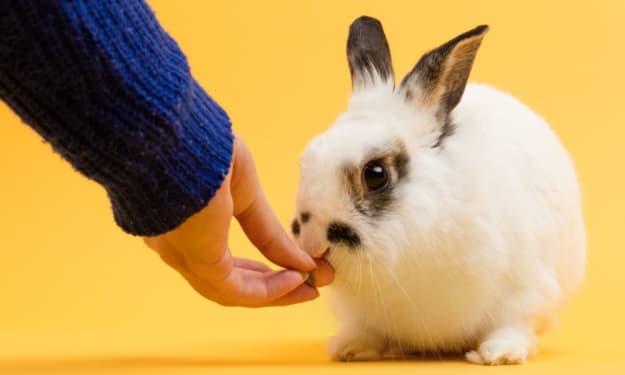How to Recognize and Prevent Rabbit Obesity
Understanding Rabbit Obesity

Obesity is a growing concern among pet rabbits, just as it is in other companion animals and even humans. Rabbits that are overweight or obese face a range of serious health issues that can significantly impact their quality of life and longevity. As responsible rabbit owners, it's crucial to understand the causes, signs, and consequences of rabbit obesity, as well as effective strategies to prevent and manage this condition.
Causes of Rabbit Obesity
The primary drivers of obesity in rabbits are closely tied to their diet and activity levels. Some of the key factors that can lead to rabbit obesity include:
- Excessive Calorie Intake: Rabbits that are fed too many high-calorie pellets, treats, or human foods are at a higher risk of becoming overweight. A diet that is heavy in alfalfa-based pellets, rather than grass hay-based, can also contribute to weight gain.
- Lack of Exercise: Rabbits are naturally active animals, but many pet rabbits do not have adequate space or opportunities to run, jump, and engage in other physical activities. Confined living conditions and limited access to exercise can result in an inactive, sedentary lifestyle that promotes weight gain.
- Breed Predisposition: Certain rabbit breeds, such as the Dwarf and Flemish Giant, are more prone to obesity due to their shorter stature and inherent tendency to be less active.
- Neutering: While neutering is generally recommended for rabbits to prevent unwanted litters and certain health issues, it can also increase the risk of weight gain if the rabbit's diet and exercise routine are not properly adjusted post-surgery.
Recognizing the Signs of Rabbit Obesity
Identifying obesity in rabbits can be a bit more challenging than in other pets, as their fluffy coats can sometimes mask the physical signs. However, there are several key indicators to look for:
- Body Condition: Gently feel your rabbit's ribs and backbone. If you can't easily feel the ribs or the backbone is well-padded with fat, your rabbit is likely overweight.
- Appearance: Observe your rabbit's overall body shape. Obese rabbits may have a rounded, "barrel-shaped" appearance, with a prominent dewlap (loose skin under the chin) and bulging skin behind the front legs.
- Behavior: Obese rabbits may exhibit sluggish or lazy behavior, with reduced activity levels and difficulty grooming themselves effectively.
- Health Issues: Obesity can lead to various health problems, such as pododermatitis (sore hocks), digestive and urinary tract complications, and an increased risk of conditions like flystrike.
Preventing and Managing Rabbit Obesity
The best approach to addressing rabbit obesity is to focus on prevention through a balanced diet and regular exercise. Here are some key strategies:
Dietary Management
- Hay-Based Diet: Provide your rabbit with a constant supply of high-quality grass hay, such as timothy or orchard grass. Hay should make up the majority of their diet, as it is low in calories and high in fiber.
- Controlled Pellet Intake: Limit the amount of commercial rabbit pellets to a small handful per day, or eliminate them entirely if your rabbit is overweight. Pellets are calorie-dense and can contribute to weight gain.
- Appropriate Treats: Offer fresh, low-calorie vegetables and herbs as occasional treats, rather than sugary or fatty snacks. Examples include leafy greens, carrots, and parsley.
- Avoid Muesli-Style Feeds: Muesli-style rabbit feeds often contain a mix of different grains and seeds, which can be high in calories and promote overeating.
Exercise and Enrichment
- Provide Ample Space: Ensure your rabbit has access to a large, enriched living environment, such as a spacious enclosure or a rabbit-proofed room, where they can freely move around and engage in natural behaviors.
- Encourage Activity: Offer your rabbit toys, tunnels, and other enrichment items that encourage physical activity and mental stimulation. You can also train your rabbit to walk on a harness and leash for supervised outdoor exercise.
- Playtime: Set aside dedicated time each day for interactive playtime, where you can engage your rabbit in chasing, jumping, and other physical activities.
Monitoring and Veterinary Care
- Regular Weigh-Ins: Weigh your rabbit regularly and keep track of their weight to identify any concerning trends or sudden changes.
- Body Condition Scoring: Learn how to assess your rabbit's body condition using a standardized scoring system, and discuss the results with your veterinarian.
- Veterinary Checkups: Schedule regular veterinary check-ups, at least once a year, to ensure your rabbit's overall health and to address any weight-related concerns.
- Seek Professional Guidance: If your rabbit is already overweight or obese, work closely with your veterinarian to develop a safe and effective weight-loss plan, including dietary adjustments and an exercise regimen.
Conclusion
Preventing and managing rabbit obesity is essential for maintaining your pet's overall health and well-being. By understanding the causes, recognizing the signs, and implementing a comprehensive approach to diet, exercise, and veterinary care, you can help your rabbit achieve and maintain a healthy weight, reducing the risk of serious health complications and ensuring a long, happy life.
About the Creator
Hasan
Welcome...
In this site of mine you can learn amazing things and many information that you don't know so please subscribe to my site.
Enjoyed the story? Support the Creator.
Subscribe for free to receive all their stories in your feed. You could also pledge your support or give them a one-off tip, letting them know you appreciate their work.






Comments
There are no comments for this story
Be the first to respond and start the conversation.